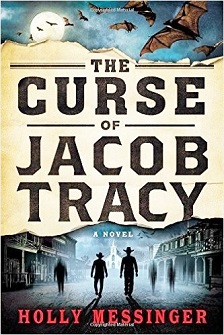by
Holly Messinger
(Thomas Dunne Books, Dec. 2015, hc, 320 pp.)
Reviewed by Dave Truesdale
“Miss Fairweather’s Chinese Butler showed Trace to the library, which was dark and cavernous, surprisingly masculine. Stuffed animals and birds loomed from the gallery, backlit by the skylights and the rose window at the head of the room. A fire helped dispel the early-March gloom, but Trace was careful not to look into any dark corners. These big old houses tended to hold nasty surprises for him.”
What a great stage-setting, atmospheric opening paragraph to The Curse of Jacob Tracy, the debut novel by Holly Messinger. The plush, masculine, Victorian-era appointments describing the library hint at the exotic, of perhaps a once aristocratic European opulence reserved only for the fabulously wealthy. With a sense of foreboding, our interest is piqued. Why does Trace not look into any dark corners, why do big old houses hold nasty surprises for him, who is this enigmatic Miss Fairweather, and why is he in her house in the first place? We’re hooked.
In order to begin to answer these questions we begin with the setting, which is 1880 St. Louis, Missouri, though Trace’s story begins at the Civil War battle of Antietam almost twenty years earlier in September of 1862, where he was severely wounded and almost died. Since that near-death experience Trace has been cursed, now able to see the ghosts of the dead. His life has since been a living hell, for this supernatural affliction has cost him his family, and his now destroyed life-calling in the church (who wants a preacher who can see ghosts?). In an attempt to move on, to survive and make something of his life, he tries to avoid ghost-populated areas and now guides wagon trains west from St. Louis, which he has done for the past eighteen years with the help of his business partner Boz, a black man who has become, over time, Trace’s closest and most trusted friend, having learned of Trace’s curse and yet has chosen to stay by his side as they make their living guiding settlers west from St. Louis—the gateway to the west—where he and Trace have made their base of operations.
During a slow period in the spring of 1880 Trace receives a rather odd job offer from the aforementioned Miss Fairweather. Welcoming the opportunity to make some money while his wagon train enterprise is on hold due to the spring weather, Trace accepts the request to retrieve an object (a small rosewood trinket box) from a dead friend of Miss Fairweather’s from a nearby town, an object she informs Trace is part of the friend’s legacy bequeathed to her, and that her health prevents her from securing it herself. Little more than a quick errand for which he will be paid handsomely Trace agrees, and he and Boz set off on what they believe to be a harmless and profitable diversion from the tedium in which they find themselves.
Arriving at the small nearby town Trace and Boz are immediately beset by powerful evil forces from which they barely escape with their lives, though they are able to secure what they have come for. Back in St. Louis, Trace confronts Miss Fairweather with her deception, to which she admits everything. It is now clear that Miss Fairweather is much more than she appears, having powerful supernatural connections and a hidden agenda of her own. She had known of Trace’s curse from the beginning, determining that he would be the only possible one to retrieve the legacy from her dead friend.
Despite his anger at Miss Fairweather, Trace learns that his powers have increased and that if he chooses to perform other tasks for her it could lead to his control over them, to the point where he could live with them and even perhaps employ them for good. It becomes clear that he needs her as much as she needs him, and a bargain is struck.
But why does this scheming, enigmatic woman really need Trace? If she is so much more powerful—through her dark dabblings into the supernatural underworld, which power grants her control over some of its demons—what can he possibly offer her? This and other questions raised as the plot unfolds, we find Trace and Boz led into darker and more dangerous situations, facing ever more deadly otherworldly foes—and on a greater scale with world-shattering consequences than they could have imagined. Each task is a further descent into the horrific bowels of evil, as Trace finds himself the pawn in a struggle between Miss Fairweather and He with whom she wages war.
I found The Curse of Jacob Tracy to be a bona fide page turner. It begins on a dark note and doesn’t let up for an instant. Holly Messinger knows how to paint scenes to create atmosphere, to reveal information at the right moment to extract the proper amount of reader excitement and tension, and with a fright factor that starts at ground zero and never looks back. While there are several skin-crawling scenes of intense horror (a passenger train is attacked by a swarm of zombie-like creatures sent by Miss Fairweather’s enemy to stop Trace and Boz from completing one of their goals, and they don’t care who they rip apart; and another being a séance at Miss Fairweather’s which turns more than grisly), Messinger takes the time to show us who Trace is, what drives him, what he fears, and how he comes to deal with the conflict between what he wants to be and dealing with his unwanted curse. In short, the reader comes to empathize with Trace as he is caught between warring supernatural forces on a macroscopic scale, while he tries to cope with such mundane issues as staying alive on the microscopic, personal level.
The rear cover blurb touts, in part, The Curse of Jacob Tracy is “a brilliantly crafted, fast-paced historical fantasy…” I would agree save that I feel a more accurate description would be historical horror (if there is such a designation, or dark fantasy at the least); historical fantasy doesn’t do it justice.
If you are a connoisseur of supernatural horror, I have a feeling you’re going to love this one. I look forward to the further adventures of Jacob Tracy; he’s an everyman hero for whom we are happy to cheer, and I trust that Holly Messinger, if this book is any indication of her talent and creativity, will not disappoint with her next one.
♣ ♣ ♣
Dave Truesdale has edited Tangent and now Tangent Online since 1993. It has been nominated for the Hugo Award six times, and the World Fantasy Award once. A former editor of the Bulletin of the Science Fiction & Fantasy Writers of America, he also served as a World Fantasy Award judge in 1998, and for several years wrote an original online column for The Magazine of Fantasy & Science Fiction. Now retired, he keeps close company with his SF/F library, the coffeepot, and old movie channels on TV. He lives in Kansas City, MO.

